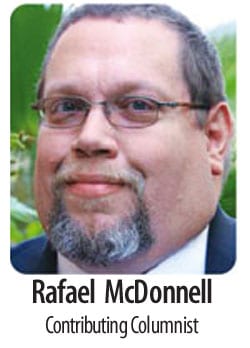20 years ago, flight crew message about changing pillows, blankets due to gay activists on board led airline to rethink its LGBT practices
 From 1988 to 2000, I was a radio newsman. I covered hundreds upon hundreds of stories during that time, but it was a story I covered 20 years ago this week for a Dallas station that helped to galvanize change on behalf of the LGBT community. It serves as a good example of how positive developments can come out of one bad incident.
From 1988 to 2000, I was a radio newsman. I covered hundreds upon hundreds of stories during that time, but it was a story I covered 20 years ago this week for a Dallas station that helped to galvanize change on behalf of the LGBT community. It serves as a good example of how positive developments can come out of one bad incident.
April 27, 1993, was a Tuesday; a week after the end of the Branch Davidian standoff in Waco, and the day after the March on Washington for LGBT Equal Rights and Liberation. It was also my first day back in the newsroom after vacation.
At that time, I produced four hours of newscasts, from 3-7 p.m. The 6 o’clock hour was a special newscast, with longer stories and more in-depth reporting. I was always on the lookout for new stories to feature in the newscast.
About 4:45 that afternoon, the station received a fax that would fit that requirement — and allow me as a journalist to push for change.
A quick note here: In 1993, I’d been out for three years. I’d been in a relationship with my first boyfriend. But I wasn’t out to my family, nor was I out to my co-workers.
The fax was from David Taffet, now a reporter for Dallas Voice but then vice president of the Dallas Gay and Lesbian Alliance. It included an inter-airline communication between crew for American Airlines at DFW International Airport.
The communication read, in all caps: “INBD CREW REQ COMPLETE CHANGE OF ALL PILLOWS BLANKETS ON AIRCRAFT DUE GAY RIGHTS ACTIVISTS GROUP ONBRD OUTBOUND CAPT AGREED.” The inbound crew were on a flight from Washington, D.C., to DFW.
I was stunned, not only as a member of the LGBT community, but also as a journalist. How could something like this happen? What assumption was the crew making about the people on board the plane? How did they know the passengers were “gay activists”? Were people going to get away with this? Remember, this was 20 years ago.
I didn’t know the answers for the first questions, but I did to the last one — the station wanted to know what happened so we could do a news story.
During the break before the 5 p.m. news, I briefly chatted with Stan, the afternoon anchor at the station, and let him know what was happening. He agreed it was a good story and should be the lead for the 6 p.m. newscast. So, I assigned our evening reporter to call the airline for their reaction, and I called David back. He had me speak with the late John Thomas, who at the time was the executive director of what is now Resource Center Dallas.
John was always good with comments — he was known as “the most visible gay man in Dallas” because he was often quoted by the media. Donna, the evening reporter, was having a hard time getting a statement from the airline.
She slipped me a note — “AA wants to know how we got information.” I wrote her back, “Doesn’t matter — story goes on at 6 with or without statement.” That shook some comments loose. At 6 p.m., Donna and I went into the studio to do the story. She did the nuts-and-bolts of what happened, and I did the sidebar story with John Thomas.
Afterward, I called my contacts at the network in New York City and asked them if they were interested in this story. Donna’s report ran nationally that evening at 8 p.m. The following day, newspapers and television stations caught up to the story we broke.
I don’t know why, but I took that fax home that night. It turned up a couple of years ago when I was looking through some old papers. I donated it to the Center, and it’s now part of the archival materials being digitized at the University of North Texas.
This incident made American Airlines look at how it handled LGBT employees. The carrier formed an LGBT employee resource group, started to market itself toward LGBT travelers and last year sent a letter to key members of the U.S. Senate advocating on behalf of the Employment Non-Discrimination Act. Today, American Airlines is also a strong and powerful champion of many local and national LGBT organizations, including Resource Center Dallas.
Would any of this have happened if the inter-airline communication hadn’t leaked out? Perhaps. But it did, and the fact that the story went national in a pre-Facebook and YouTube era made a difference.
Rafael McDonnell is communications and advocacy manager, Resource Center Dallas. He can be reached at RMcDonnell@rcdallas.org.
This article appeared in the Dallas Voice print edition April 26, 2013.
















